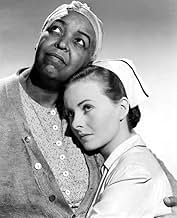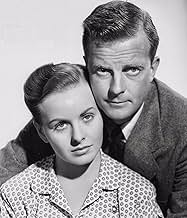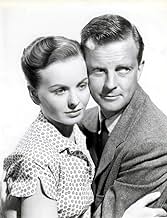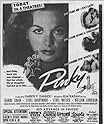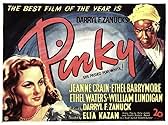NOTE IMDb
7,2/10
3,6 k
MA NOTE
Ajouter une intrigue dans votre langueA light-skinned black woman falls in love with a white doctor, though he is unaware of her true race.A light-skinned black woman falls in love with a white doctor, though he is unaware of her true race.A light-skinned black woman falls in love with a white doctor, though he is unaware of her true race.
- Réalisation
- Scénario
- Casting principal
- Nommé pour 3 Oscars
- 3 victoires et 4 nominations au total
Fred Aldrich
- Townsman
- (non crédité)
Shelby Bacon
- Boy
- (non crédité)
Betty Beard
- Minor Role
- (non crédité)
Rene Beard
- Teejore
- (non crédité)
Arthur Berkeley
- Townsman
- (non crédité)
Patsy Boniface
- Minor Role
- (non crédité)
Mildred Boyd
- Nurse
- (non crédité)
Avis à la une
We'll know we've "arrived" when people can get past the casting of Jeanne Crain as a woman of color. There ARE mixed race women who are as light as Jeanne Crain, but because of the "one drop rule," in 1949 they were, and often still today are -considered "black." In today's multi-cultural society these women often embrace their heritage, but the issues they face remain sadly the same today in many facets. Example: African Americans who are educated are often told they are "talking white."
There is a reason that "she's passing" became an understood term. Very light skinned women & men in the early part of the 1900s DID try to do what Pinky here does.
I was really encouraged to see the scene with Nina Mae McKinney next to Frederick O'Neal, next to Jeanne Crain, all playing "black folks." THAT is the reality of miscegenation in the South, and that is what people still have trouble with: sometimes race is not just black and white. It is uncomfortable and true. (McKinney is marvelous, and fills every second of her screen time, whether she is removing a pebble from her shoe or coyly playing piano on top of a fence.)
I sadly find this film completely relevant today. These conversations of segregation and intermarriage are STILL going strong. There are African Americans who talk about "white women taking our men" or people of all races saying, "stay with your own race." This is segregationist, this is racist, and it still exists very strongly in all racial communities.
Dorothy Dandridge and Lena Horne- both beautiful & talented - are often mentioned as possible contenders for this role. They simply were NOT light enough to pass for white, it hampered their careers, and they have both acknowledged that. Hollywood in general likes their races obvious, casting is still largely done by type and stereotype, no matter what race even today it would be hard to find an actress of stature who identifies herself as black, but who can totally pass as white; the market doesn't hire these women.
Type casting is still the norm. Even my dark skinned actress friends have been told they don't "talk black enough" in auditions. Ethel Waters and Ethel Barrimore here, both fine actresses at the top of their game, were both type cast here in roles that they've basically played several times before; it is only the script context that made this special.
Jeanne Crain had enormous courage to portray this role. Not only is she perpetually faulted for being a white woman playing this role, but she risked her career, some people questioned her heritage in a racist age. That is a tribute to the reality and sensitivity she brought to the role, and her acting, which is often maligned because she had reserve. Her "under acting" is actually the preferred style today in TV and film. She was ahead of her time.
Part of why Crain is not liked much today is that she was a 40s type that is not valued today. Restrained, ladylike, mature in mindset, "high minded" - this is what she represented, and these things are not looked for in leading ladies today. What she represents has gone out of fashion; it was going out of fashion even then, and Kazan valued grittier, dirtier types like Brando. Kazan, who initially labeled her an impassive beauty queen, eventually credited her fine work.
This movie is sensitively done in all respects with really great performances top to bottom. It is not glossy or simple, neither race is solely good or solely bad. It is a disservice to have the only DVD commentary done by someone who clearly still does not like the film and doesn't appreciate the complexity of Crain's work here. That a New Yorker thought the court trial didn't look real because people were all fanning themselves shows he has never spent time in the south in a public gathering place.
This film is galling and aggravating, and unfortunately still very real. This is not a fun film, it is a great film, that speaks just as much to attitudes held today as it did then.
There is a reason that "she's passing" became an understood term. Very light skinned women & men in the early part of the 1900s DID try to do what Pinky here does.
I was really encouraged to see the scene with Nina Mae McKinney next to Frederick O'Neal, next to Jeanne Crain, all playing "black folks." THAT is the reality of miscegenation in the South, and that is what people still have trouble with: sometimes race is not just black and white. It is uncomfortable and true. (McKinney is marvelous, and fills every second of her screen time, whether she is removing a pebble from her shoe or coyly playing piano on top of a fence.)
I sadly find this film completely relevant today. These conversations of segregation and intermarriage are STILL going strong. There are African Americans who talk about "white women taking our men" or people of all races saying, "stay with your own race." This is segregationist, this is racist, and it still exists very strongly in all racial communities.
Dorothy Dandridge and Lena Horne- both beautiful & talented - are often mentioned as possible contenders for this role. They simply were NOT light enough to pass for white, it hampered their careers, and they have both acknowledged that. Hollywood in general likes their races obvious, casting is still largely done by type and stereotype, no matter what race even today it would be hard to find an actress of stature who identifies herself as black, but who can totally pass as white; the market doesn't hire these women.
Type casting is still the norm. Even my dark skinned actress friends have been told they don't "talk black enough" in auditions. Ethel Waters and Ethel Barrimore here, both fine actresses at the top of their game, were both type cast here in roles that they've basically played several times before; it is only the script context that made this special.
Jeanne Crain had enormous courage to portray this role. Not only is she perpetually faulted for being a white woman playing this role, but she risked her career, some people questioned her heritage in a racist age. That is a tribute to the reality and sensitivity she brought to the role, and her acting, which is often maligned because she had reserve. Her "under acting" is actually the preferred style today in TV and film. She was ahead of her time.
Part of why Crain is not liked much today is that she was a 40s type that is not valued today. Restrained, ladylike, mature in mindset, "high minded" - this is what she represented, and these things are not looked for in leading ladies today. What she represents has gone out of fashion; it was going out of fashion even then, and Kazan valued grittier, dirtier types like Brando. Kazan, who initially labeled her an impassive beauty queen, eventually credited her fine work.
This movie is sensitively done in all respects with really great performances top to bottom. It is not glossy or simple, neither race is solely good or solely bad. It is a disservice to have the only DVD commentary done by someone who clearly still does not like the film and doesn't appreciate the complexity of Crain's work here. That a New Yorker thought the court trial didn't look real because people were all fanning themselves shows he has never spent time in the south in a public gathering place.
This film is galling and aggravating, and unfortunately still very real. This is not a fun film, it is a great film, that speaks just as much to attitudes held today as it did then.
I've just seen this film for the 3rd time although I'm sure I hadn't seen it for at least 10 years. I had forgotten the depth and intensity of the prejudice displayed in the film. It is taking nothing away from Jeanne Craine's sensitive and beautiful performance to say that the star of the film is Ethel Waters - she is simply a magnificent presence throughout. It is one of those performances where every fibre of being is transmitted thru to the viewer - you cannot help but feel that the character is one of the strongest and bravest women ever shown on screen. Considering the shocking 1950's world of Amos and Andy and the in-every-sense-white-bread fiction world of Hollywood - Father Knows Best, The Donna Reed Show, etc - it is startling to see how movies so transcended the comfort-food level of TV and challenged audiences. This movie belongs, I believe, in the highest echelon of social commentary films - such as To Kill a Mockingbird, Gentlemen's Agreement. Absolute must see!!!
Elia Kazan took over the helm of PINKY when John Ford requested replacement as having no real interest in the story. He not only took over, but he did a superb job.
Personally, it took awhile for me to get over the idea of casting JEANNE CRAIN as a light-skinned black, but she does some of her best work here. Same can be said of Ethel Waters and Ethel Barrymore, and not surprisingly, all three actresses were nominated for Oscars. Undoubtedly, all benefited by Kazan's firm direction.
The story is essentially written to show the racial bigotry that existed (and still does) in many parts of the South. Without going into plot development, let's say the ending is a bit predictable, but the film still remains powerful and sensitive in its treatment of the subject matter.
In 1949, this was a daring film for Fox to make, risking the possibility of hurting the reputation of its most popular box-office star at that time, Jeanne Crain. But credit goes to Darryl F. Zanuck for permitting his studio to make films like THE SNAKE PIT and GENTLEMAN'S AGREEMENT, risky and controversial. The box-office results and critical acclaim justified the risk.
Well worth seeing, absorbing and sensitive.
Personally, it took awhile for me to get over the idea of casting JEANNE CRAIN as a light-skinned black, but she does some of her best work here. Same can be said of Ethel Waters and Ethel Barrymore, and not surprisingly, all three actresses were nominated for Oscars. Undoubtedly, all benefited by Kazan's firm direction.
The story is essentially written to show the racial bigotry that existed (and still does) in many parts of the South. Without going into plot development, let's say the ending is a bit predictable, but the film still remains powerful and sensitive in its treatment of the subject matter.
In 1949, this was a daring film for Fox to make, risking the possibility of hurting the reputation of its most popular box-office star at that time, Jeanne Crain. But credit goes to Darryl F. Zanuck for permitting his studio to make films like THE SNAKE PIT and GENTLEMAN'S AGREEMENT, risky and controversial. The box-office results and critical acclaim justified the risk.
Well worth seeing, absorbing and sensitive.
I saw this film some years after it came out, in a Texas Baptist orphans home, as a preadolescent. In the years to follow, I developed a fascination for Ethel Waters, esp. when I saw her interpretation of Carson McCuller's "A Member of the Wedding".
When I saw the film tonight on American Movie Classics, a lot of years had passed since first having seen it. Ethel Waters' performance struck me as cowed and subservient. In the court scene while being questioned by the plaintiff's council, she actually flinched when he raised his voice. ...And I'm thinking, 'Damn, that woman is really intimidated.' Having read her autobio, as well as a bio on her, I'm aware that not one woman in a million suffered through a similar childhood: a b*****d born of a 13-year-old rape victim - unwanted and shuffled from pillar to post to eventually become a washerwoman...it's a wonder she survived.
Yet survive she did. Not surprisingly, she had a monster chip on her shoulder. It is my understanding that John Ford, the man who was to direct "Pinky", had such a run-in with Miss Waters that he quit, and Kazan took over. The word is that neither could stand the sight of the other.
The movie is an important one - and I'd like to think that the reason goes beyond the juxtapositioning of America's treatment of blacks in the Forties with today's suffocating PC standards. There is the understated acting, for one thing. Ethel Barrymore always played the dignified albiet intimidating elderly lady in her later years. Yet in "Pinky", she is strong without being absurdly powerful. How well that woman delivers her lines...!
What I also liked was, while the white majority were unkind to Pinky, I can attest as a Southerner (well, Texan), that Kazan presented them truthfully. He only demonized one woman: the older cousin-plaintiff.
It is surprising that this film wasn't presented in a more gritty format; that there wasn't more preaching in it, that it wasn't condescending to whites. None of these failings mar this splendid film. Forty years after having seen it, I realize a superb gentleness that isn't to be found in American films. At a guess, that's because a generation ago most films were made for 30-and-over adults, whereas today they're almost exclusively made for 13 - 25 year olds.
I will give "Pinky" my highest compliment: It is literary.
When I saw the film tonight on American Movie Classics, a lot of years had passed since first having seen it. Ethel Waters' performance struck me as cowed and subservient. In the court scene while being questioned by the plaintiff's council, she actually flinched when he raised his voice. ...And I'm thinking, 'Damn, that woman is really intimidated.' Having read her autobio, as well as a bio on her, I'm aware that not one woman in a million suffered through a similar childhood: a b*****d born of a 13-year-old rape victim - unwanted and shuffled from pillar to post to eventually become a washerwoman...it's a wonder she survived.
Yet survive she did. Not surprisingly, she had a monster chip on her shoulder. It is my understanding that John Ford, the man who was to direct "Pinky", had such a run-in with Miss Waters that he quit, and Kazan took over. The word is that neither could stand the sight of the other.
The movie is an important one - and I'd like to think that the reason goes beyond the juxtapositioning of America's treatment of blacks in the Forties with today's suffocating PC standards. There is the understated acting, for one thing. Ethel Barrymore always played the dignified albiet intimidating elderly lady in her later years. Yet in "Pinky", she is strong without being absurdly powerful. How well that woman delivers her lines...!
What I also liked was, while the white majority were unkind to Pinky, I can attest as a Southerner (well, Texan), that Kazan presented them truthfully. He only demonized one woman: the older cousin-plaintiff.
It is surprising that this film wasn't presented in a more gritty format; that there wasn't more preaching in it, that it wasn't condescending to whites. None of these failings mar this splendid film. Forty years after having seen it, I realize a superb gentleness that isn't to be found in American films. At a guess, that's because a generation ago most films were made for 30-and-over adults, whereas today they're almost exclusively made for 13 - 25 year olds.
I will give "Pinky" my highest compliment: It is literary.
Although it was controversial at the time, 'Pinky' is very highly regarded by most now. And rightly so. The cast is a great one, the most familiar cast member to me being Ethel Barrymore. Have said elsewhere about my high admiration for Elia Kazan and most of his films. 'Pinky' was most intriguing to me though for its subject of racism and bigotry, it was a very relevant theme at the time and very prominent and was very brave to address on film and sadly it is still.
'Pinky' turned out to be a great film, with so many brilliantly done things. Not quite one of Kazan's very finest, but close to being up there and close to being a near-classic. Really appreciated that it did tackle a subject like this, a topical one and important to address despite it hitting so close to home for many at the time and now, and appreciated even more so how it tackled it. Even if 'Pinky' isn't one of Kazan's best, it is one of his most sincere films and a contender for the bravest in a filmography where all the themes in all his films were quite courageously heavy and complex.
The production values are very high, lots of atmosphere in the art direction enhanced by the quite beautiful cinematography. Kazan's direction never feels self-indulgent or heavy-handed, and he seemed like he was at ease with the material and like he knew what he wanted to do with it. Alfred Newman always was a great film composer, one of the best at the time and his style was a distinctive one, one that was always sumptuous and stirring without ever over-bearing the atmosphere. That's the case here in 'Pinky'.
Moreover, 'Pinky' is sensitively scripted, making its points without hammering home. The dialogue was intelligently written and concise enough to not feeling too rambling. The story is a very emotionally powerful one, one that really hits hard and makes for unflinching viewing. Yet doing so without being prejudicial or one-sided, or with a complete lack of subtlety, actually being done with a lot of poignant sincerity that helps make it a real tear-jerker of a film. It is not "outdated" at all in my view, the subject was very relevant back then and sadly it still is, it is also one that has always been bold to portray on film and worthy of admiration whenever it is regardless of its execution.
Characters are well realised and don't seem like one-dimensional stereotypes sugar-coated or ham-fisted. Coming over like real human beings. The uniformly fine performances help, while Jeanne Crain is very moving and gives one of her best performances it's a magnificent Ethel Waters that comes off strongest.
Weak link, the only one really, is the very easily foreseeable and too tidily tied up ending.
Overall, exceptionally well done and very brave. 9/10
'Pinky' turned out to be a great film, with so many brilliantly done things. Not quite one of Kazan's very finest, but close to being up there and close to being a near-classic. Really appreciated that it did tackle a subject like this, a topical one and important to address despite it hitting so close to home for many at the time and now, and appreciated even more so how it tackled it. Even if 'Pinky' isn't one of Kazan's best, it is one of his most sincere films and a contender for the bravest in a filmography where all the themes in all his films were quite courageously heavy and complex.
The production values are very high, lots of atmosphere in the art direction enhanced by the quite beautiful cinematography. Kazan's direction never feels self-indulgent or heavy-handed, and he seemed like he was at ease with the material and like he knew what he wanted to do with it. Alfred Newman always was a great film composer, one of the best at the time and his style was a distinctive one, one that was always sumptuous and stirring without ever over-bearing the atmosphere. That's the case here in 'Pinky'.
Moreover, 'Pinky' is sensitively scripted, making its points without hammering home. The dialogue was intelligently written and concise enough to not feeling too rambling. The story is a very emotionally powerful one, one that really hits hard and makes for unflinching viewing. Yet doing so without being prejudicial or one-sided, or with a complete lack of subtlety, actually being done with a lot of poignant sincerity that helps make it a real tear-jerker of a film. It is not "outdated" at all in my view, the subject was very relevant back then and sadly it still is, it is also one that has always been bold to portray on film and worthy of admiration whenever it is regardless of its execution.
Characters are well realised and don't seem like one-dimensional stereotypes sugar-coated or ham-fisted. Coming over like real human beings. The uniformly fine performances help, while Jeanne Crain is very moving and gives one of her best performances it's a magnificent Ethel Waters that comes off strongest.
Weak link, the only one really, is the very easily foreseeable and too tidily tied up ending.
Overall, exceptionally well done and very brave. 9/10
Le saviez-vous
- AnecdotesJohn Ford was the original director of the film but after seeing dailies, Darryl F. Zanuck felt Ford wasn't connecting with the material. Zanuck called Elia Kazan in New York and asked him to take over the film. Kazan felt he owed Zanuck for his film career and agreed to do the movie without even looking at the script. He flew to Los Angeles and started filming the next Monday.
- GaffesWhen the white officer slaps Rozelia on the left side of her face, she mistakenly rubs the right side of her face.
- Citations
Pinky Johnson: I'm a Negro. I can't forget it, and I can't deny it. I can't pretend to be anything else, and I don't want to be anything else. Don't you see, Tom?
Dr. Thomas Adams: No, I don't.
Pinky Johnson: You can't live without pride.
- ConnexionsFeatured in Biography: Darryl F. Zanuck: 20th Century Filmmaker (1995)
Meilleurs choix
Connectez-vous pour évaluer et suivre la liste de favoris afin de recevoir des recommandations personnalisées
- How long is Pinky?Alimenté par Alexa
Détails
- Date de sortie
- Pays d’origine
- Langue
- Aussi connu sous le nom de
- Lo que la carne hereda
- Lieux de tournage
- Société de production
- Voir plus de crédits d'entreprise sur IMDbPro
Box-office
- Montant brut aux États-Unis et au Canada
- 4 200 000 $US
- Durée
- 1h 42min(102 min)
- Couleur
- Rapport de forme
- 1.37 : 1
Contribuer à cette page
Suggérer une modification ou ajouter du contenu manquant


